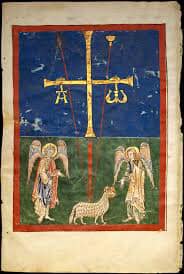 Gospel of 4 April 2020
Gospel of 4 April 2020
Saturday of the Fifth Week of Lent
John 11:45-56
Jesus was to die to gather together the scattered children of God
Many of the Jews who had come to visit Mary and had seen what Jesus did believed in him, but some of them went to tell the Pharisees what Jesus had done. Then the chief priests and Pharisees called a meeting. ‘Here is this man working all these signs’ they said ‘and what action are we taking? If we let him go on in this way everybody will believe in him, and the Romans will come and destroy the Holy Place and our nation.’ One of them, Caiaphas, the high priest that year, said, ‘You do not seem to have grasped the situation at all; you fail to see that it is better for one man to die for the people, than for the whole nation to be destroyed.’ He did not speak in his own person, it was as high priest that he made this prophecy that Jesus was to die for the nation – and not for the nation only, but to gather together in unity the scattered children of God. From that day they were determined to kill him. So Jesus no longer went about openly among the Jews, but left the district for a town called Ephraim, in the country bordering on the desert, and stayed there with his disciples.
The Jewish Passover drew near, and many of the country people who had gone up to Jerusalem to purify themselves looked out for Jesus, saying to one another as they stood about in the Temple, ‘What do you think? Will he come to the festival or not?’
Reflexion
Holy Week begins tomorrow with Palm Sunday, so this is the time of the year when the Church wants us to look intently at the Cross. The cross forces us to make a choice - what is worth sacrificing and what is worth keeping? The high priest and the Sanhedrin, the religious council of Jews, were forced to make a choice but their choice turns out to be a self-serving one - it is better for one man to die than for a nation to be destroyed. One man would be sacrificed for the good of all. And ironically, as things turned out, Jesus would follow this path - He would sacrifice Himself - “to die for the nation – and not for the nation only, but to gather together in unity the scattered children of God.”
The events of Holy Week is set against the backdrop of the Jewish Feast of the Passover. But the passion of our Lord and His vicarious sacrifice also points to another Jewish Feast, the "Day of Atonement" (Hebrew Yom Kippur), described in Leviticus 16, which was even holier than the Passover. In fact it is considered by Jews to be their most holy day.
There were two important features for this Day of Atonement. First, it was the one day of the year that the high priest, and only the high priest, entered the Most Holy Place (Holy of Holies) in the Temple where he presented sacrificial blood as atoning sacrifice for the sins of Israel and the purification of the Temple. It was a form of spiritual decontamination against the pandemic infection of sin.
Second, the Day of Atonement included a ceremony that involved the expulsion of a living animal from the camp, traditionally translated as the "scapegoat." Two goats would be chosen. The unblemished one would be sacrificed to God and the other goat, the scapegoat, would undergo a ritual which could only be compared to a general absolution given to the people. The high priest would place his hands on the head of the scapegoat and confess the sins of Israel, this symbolised the transference of the people's sin to the goat (vv. 20-22). Thereafter be scapegoat was released into the wilderness, with the hope that it would take away the sins of Israel. Better for one goat to die than a nation be destroyed.
Together the goat sacrificed and the living scapegoat acted as symbolic substitutes for the people and that they bore the penalty of the sin. The sacrificed goat perished and the scapegoat took away the impurities and sins to the wilderness. But in reality, both the sacrificed goat and the scapegoat were empty rituals, they did not achieve what they were intended to do - that is, to remove sin. Both actually prefigured Jesus, the only One who could take away our sins, the Passover Lamb of God, the One who bore our sins, and by taking them away, frees us from the guilt of our sins.
Our Lord Jesus had to die, He willingly chose to die, so that our sins may be finally removed and we will not perish with a death sentence over our heads. Jesus gave up His life for us. He exchanged His life for our freedom.
The Jews would usually prepare themselves each year for the Day of Atonement by humbling themselves in penance before God. As we approach Good Friday, let us too be sorrowful for our sins and the death Jesus suffered for us. Let us do penance by fasting, praying and giving alms where we are able. For this coming Friday we will commemorate what the high priest had prophesied, “it is better for one man to die.” Let us never forget that He died not just for the nation “but to gather together in unity the scattered children of God.” He died for you and me.
